The Divine Weapon
| The Divine Weapon | |
|---|---|
 Theatrical poster | |
| Korean name | |
| Hangul | 신기전 |
| Hanja | 神機箭 |
| Revised Romanization | Singijeon |
| McCune–Reischauer | Sin'gijŏn |
| Directed by | Kim Yoo-jin |
| Written by | Lee Man-hee |
| Produced by | Kang Woo-suk |
| Starring | Jung Jae-young Han Eun-jung Huh Joon-ho Ahn Sung-ki |
| Cinematography | Byun Hee-sung |
| Edited by | Kim Hyeon |
| Music by | Jo Seong-woo |
Production companies | Cinema Service KnJ Entertainment |
| Distributed by | CJ Entertainment |
Release date |
|
Running time | 134 minutes |
| Country | South Korea |
| Language | Korean |
| Box office | US$19,991,573[1] |
The Divine Weapon (Korean: 신기전; Hanja: 神機箭; RR: Singijeon) is a 2008 South Korean action drama film starring Jung Jae-young and Han Eun-jung. It was released on September 4, 2008.
Plot
During the reign of King Sejong the Great, Joseon Korea faces increasing hostility from Ming China. Ming China, without restraint, mounts unrelenting demands against the Korean crown, further entrenching distrust and aversion to subservience. Ming China has especially been provoked by leaked news that Korea had under way an arms development program that would undermine theirs. Mounting pressure by the threat of invasion and sending down the Emperor's commands requesting tribute of young Korean girls to be sent to China, to reduce Korea's manpower and debilitate its military capacity, the grip around the throat becomes ever tighter. It seems Joseon's fate is dependent on completing an unfinished project – that of making Singijeon or the Divine Weapon a reality.
In the final battle, severely outnumbered Korean forces (less than 100 men) successfully defeated the thousands of Ming Chinese in armed combat with spears, bombs, and several finished Singijeon via several hwachas. Thousands of Ming Chinese foot soldiers are killed as the arrows in the Singijeon are launched. More are killed with the gunpowder packed inside the arrows (standard Singeijeons). Those in the Ming Chinese army who remained are finished off with the large model Singijeons (대신기전, Grand Singijeon), except one of the nobles who prefers peace over warfare.
Cast
- Jung Jae-young ... Seol-joo
- Han Eun-jung ... Hong-ri
- Huh Joon-ho ... Chang-kang
- Ahn Sung-ki ... King Sejong
- Jeong Seong-mo ... Sa Ma-soon
- Kim Myeong-soo ... Ggya Oh-ryung
- Lee Do-kyeong ... Hong-man
- Do Yi-seong ... In-ha
- Ryu Hyun-kyung ... Bang-wook
- Seo Joo-seong ... Moo-saeng
- Cha Soon-bae ... Ming1
Release
The Divine Weapon was released in South Korea on 4 September 2008, topping the box office on its opening weekend with 630,257 admissions.[2] It led the box office for a further two weeks,[3][4] and as of 9 November had accumulated a total of 3,749,611 admissions. As of 16 November, the film had grossed a total of US$19,991,573.[1] making it the seventh most popular domestic film that year.
Reception
The film was heavily criticized by Chinese audiences for historical inaccuracies and revisionism.[5] For example, the movie depicted Ming China and Joseon Korea in conflict around 1448, however in reality two nations never fought and were in fact allies in resisting Japanese invasion. The depicted the tribute of young girls occurred under the Mongol-led Yuan dynasty (1271–1368). The movie also suggested that the Ming dynasty tried to steal multiple rocket carts blueprints from Korea, despite in reality China developed rocket arrows and rocket carts that predates Korean efforts.[6][7]
Awards and nominations
- Nomination – Best Director – Kim Yoo-jin
- Nomination – Best Art Direction – Min Eon-ok
- Nomination – Best New Actress – Han Eun-jung
- 2008 Korean Film Awards
- Nomination – Best Actor – Jung Jae-young
- Nomination – Best Sound – Oh Se-jin
- 2009 Fajr International Film Festival, "World Panorama" section[9]
- Best Technical and Artistic Achievement
- Best Film
- Best Editing – Kim Hyeon
- Best Sound – Oh Se-jin
- Nomination – Best Actor – Jung Jae-young
- Nomination – Best Lighting – Im Jae-young
- Nomination – Best Visual Effects – Jeong Seong-jin, Han Young-woo
- Nomination – Best Planning – Lee Young-in
References
- ^ a b "South Korea Box Office November 14–16, 2008 Archived 2018-02-10 at the Wayback Machine". Box Office Mojo. Retrieved 26 November 2008.
- ^ "Korean Box Office Archived 2011-06-04 at the Wayback Machine" (Week-end 2008.09.05 ~ 2008.09.07). Hancinema. Retrieved 26 November 2008.
- ^ "Korean Box Office Archived 2011-06-04 at the Wayback Machine" (Week-end 2008.09.12 ~ 2008.09.14). Hancinema. Retrieved 26 November 2008.
- ^ "Korean Box Office Archived 2011-06-04 at the Wayback Machine" (Week-end 2008.09.19 ~ 2008.09.21). Hancinema. Retrieved 26 November 2008.
- ^ "页面没有找到". Archived from the original on 2013-10-29. Retrieved 2012-04-11.
- ^ "【神機箭】的反華意識". Archived from the original on 2015-09-23. Retrieved 2012-06-11.
- ^ "YY无极限 (YY has no limit)". Archived from the original on 2013-06-22. Retrieved 2012-06-11.
- ^ "The Divine Weapon – Awards" Archived 2011-08-14 at the Wayback Machine. Cinemasie. Retrieved 12 April 2015.
- ^ برف، بیضایی و بگیچ سیمرغهای بلورین را به خانه بردند [Snow, Beyzai and Begić won the awards] (in Persian). Mehr News Agency. 5 February 2009.
External links
- Official website (in Korean)
- The Divine Weapon at IMDb
- The Divine Weapon at the Korean Movie Database (in Korean)
- The Divine Weapon at HanCinema